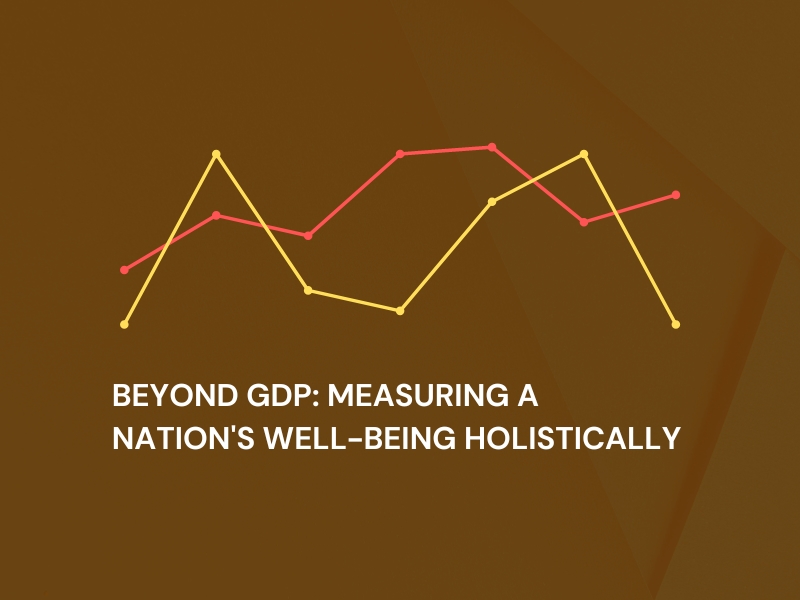For decades, Gross Domestic Product (GDP) has stood as the quintessential measure of a nation’s prosperity and progress. It’s a figure that reflects the economic vitality of a country, capturing the vast monetary transactions that occur within its borders. GDP undoubtedly offers essential insights into a nation’s economic well-being, acting as a vital gauge for policymakers and economists worldwide. However, the story doesn’t end there. The concept of well-being transcends mere economic numbers. True prosperity isn’t just about financial wealth; it’s about the quality of life, the overall happiness of citizens, the state of the environment, and the strength of social bonds. In essence, it encompasses all the factors that contribute to a nation’s holistic health and happiness. This article dives into the evolving world of well-being assessment, exploring why going “beyond GDP” is crucial for a more comprehensive understanding of a nation’s true prosperity. We’ll journey through the myriad indicators and indices that shed light on the multifaceted nature of well-being, unveiling a richer, more meaningful perspective on the state of nations in our interconnected world.
The GDP Standard: A Limited Perspective
Gross Domestic Product (GDP), while undeniably valuable, operates within a confined realm of economic assessment. It excels at quantifying the monetary value of goods and services produced within a country’s borders, giving us a sense of its economic prowess. However, it has inherent limitations. GDP offers no insights into the distribution of wealth, environmental sustainability, or the overall happiness and health of a nation’s citizens. It doesn’t account for income inequality, the state of education and healthcare, or the quality of the environment. In essence, GDP is a financial snapshot, and although it tells us about the size of the economic pie, it says little about how that pie is divided or whether it’s baked sustainably. To comprehend the true state of a nation’s well-being, we must look beyond GDP and delve into a more nuanced evaluation that encapsulates the holistic aspects of human life and societal health.
GDP and Quality of Life
GDP growth undoubtedly has the potential to enhance the standard of living within a nation. It can signify increased economic opportunities, better infrastructure, and improved access to goods and services. However, the key caveat lies in the distribution of these benefits. Even when GDP rises, disparities in income distribution can persist, leaving a substantial portion of the population with limited access to the improved quality of life that economic growth promises. Factors like income inequality, unequal access to education and healthcare, and disparities in infrastructure development can greatly affect the extent to which the population as a whole benefits from GDP growth. Consequently, while GDP is a vital economic indicator, it doesn’t inherently guarantee an equitable and improved quality of life for all citizens. To understand the holistic well-being of a nation, we must consider a broader spectrum of factors beyond mere economic output.
The Limitations of GDP
Indeed, GDP serves as a valuable but narrow lens through which we view a nation’s economic health. It essentially quantifies the monetary value of goods and services produced but falls short of capturing the complexities of human well-being. Income inequality, for instance, can persist even in the presence of robust GDP growth, leaving a significant portion of the population struggling to meet their basic needs. Moreover, GDP doesn’t incorporate vital considerations like the sustainability of economic activities or the overall happiness and health of a nation’s citizens. It also excludes non-market activities such as unpaid domestic work, which significantly contributes to a society’s functioning. To measure a nation’s prosperity more comprehensively, we must look beyond GDP and consider a broader spectrum of factors that truly reflect the well-being of its people.
The Human Development Index (HDI)
The Human Development Index (HDI) represents a significant departure from the narrow confines of GDP as a measure of a nation’s well-being. Introduced by the United Nations, HDI evaluates countries based on three crucial dimensions: life expectancy, education, and per capita income. By considering these factors, HDI provides a more comprehensive perspective on a nation’s overall development and the quality of life experienced by its citizens. It acknowledges that well-being extends beyond financial prosperity to include access to healthcare, educational opportunities, and the ability to lead a long and fulfilling life. As a result, HDI has become a vital tool for policymakers, enabling them to make informed decisions aimed at improving the lives of their citizens.
Happiness Index
Happiness or well-being indexes, such as Bhutan’s Gross National Happiness Index, offer a more nuanced perspective on a nation’s prosperity and the quality of life experienced by its citizens. These indexes go beyond economic indicators to measure subjective well-being and life satisfaction. In Bhutan’s case, the Gross National Happiness Index evaluates a wide range of factors, including psychological well-being, health, education, cultural diversity, and environmental sustainability. By considering these aspects, happiness indexes provide valuable insights into the holistic well-being of a population, highlighting the importance of mental health, community cohesion, and cultural preservation alongside economic growth. These measures acknowledge that true prosperity encompasses not only material wealth but also the intangible elements that contribute to human happiness and fulfilment.
Genuine Progress Indicator (GPI)
The Genuine Progress Indicator (GPI) is a comprehensive metric that goes beyond GDP to assess a nation’s well-being more accurately. It takes into account a range of critical factors, including income inequality, environmental degradation, and non-market activities, which GDP tends to overlook. By adjusting GDP to reflect these factors, the GPI provides a more realistic evaluation of whether a nation’s economic growth genuinely contributes to the overall well-being of its citizens. This holistic approach recognizes that true progress involves not only economic prosperity but also social equity, environmental sustainability, and the well-being of the population. GPI serves as a valuable tool for policymakers and researchers seeking to better understand the complex interplay of factors that contribute to a nation’s quality of life and sustainable development.
Happy Planet Index (HPI)
The Happy Planet Index (HPI) takes a unique approach to evaluating a nation’s well-being by considering not only the happiness and life satisfaction of its citizens but also the ecological sustainability of their lifestyles. It assesses whether a nation’s people can lead long and fulfilling lives while staying within the ecological boundaries of our planet. In essence, the HPI seeks to answer the question: Can a nation achieve a high quality of life for its citizens without depleting Earth’s resources and damaging the environment? By integrating these dimensions, the HPI offers a comprehensive perspective on well-being that encourages sustainable practices and responsible living. It promotes the idea that true progress should prioritize both human flourishing and the health of the planet we call home.
Measuring Social Capital
In the pursuit of a more comprehensive understanding of a nation’s well-being, the concept of social capital comes to the forefront. Social capital refers to the intangible assets a society possesses through its social relationships and networks. These assets include trust, shared values, cooperation, and a sense of belonging among members of a community. The strength of these social bonds can significantly impact the overall quality of life for a nation’s citizens. When individuals have a robust support system, feel connected to their communities, and can rely on social networks, they tend to experience higher levels of well-being. Therefore, measuring social capital provides valuable insights into the social fabric of a society and its influence on the overall happiness and life satisfaction of its people.
Environmental Sustainability
As the world grapples with pressing environmental challenges, it becomes increasingly evident that evaluating a nation’s well-being goes beyond economic figures. Environmental sustainability, a critical facet of holistic well-being, focuses on a nation’s ecological footprint and its commitment to preserving natural resources. A nation’s well-being is inherently tied to its environment. Sustainable practices, such as responsible resource management, reduced carbon emissions, and the protection of biodiversity, are integral to ensuring that future generations can enjoy a high quality of life. Therefore, any comprehensive measurement of well-being must take into account a nation’s efforts to safeguard its environment and mitigate the impacts of climate change. Balancing economic growth with environmental sustainability is a key challenge for nations worldwide, and it directly influences the overall well-being of their citizens.
The Role of Public Policy
In the pursuit of measuring and improving well-being beyond GDP, the role of public policy cannot be overstated. Governments wield considerable influence over the various factors that contribute to the quality of life of their citizens. Public policies can directly impact income distribution through taxation and social welfare programs, addressing income inequality and poverty. They can also shape access to essential services like education and healthcare, ensuring that all citizens have the opportunity to lead healthy and fulfilling lives. Moreover, through environmental regulations and sustainability initiatives, governments can safeguard natural resources and mitigate the adverse effects of climate change, thereby promoting ecological well-being. The design and implementation of public policies, therefore, play a pivotal role in determining a nation’s overall well-being, transcending the confines of GDP to address the multifaceted aspects of life quality.
Measuring Beyond GDP: A Global Trend
The recognition of the limitations inherent in GDP as a sole measure of a nation’s prosperity is not confined to a few pioneering nations; it’s a global trend that’s gaining momentum. Countries around the world are awakening to the necessity of adopting comprehensive well-being metrics to inform their policy decisions accurately. They understand that true progress goes beyond economic growth and encompasses factors like health, education, income distribution, environmental sustainability, and the overall happiness and contentment of their citizens. This global shift signifies a commitment to creating societies where every individual can lead a fulfilling life, and the well-being of people and the planet takes precedence alongside economic prosperity. As more nations embrace this paradigm shift, the world moves closer to a future where well-being becomes the true measure of a nation’s success, transcending the confines of GDP statistics.
Conclusion: A Holistic Approach to Prosperity
In the quest for comprehensive measures of prosperity, it becomes evident that GDP, while valuable, is merely one piece of the puzzle. The world is increasingly recognizing the need to move beyond the confines of economic growth and embrace holistic approaches that capture the multifaceted nature of well-being. While GDP remains a crucial economic barometer, supplementing it with metrics that assess life quality, happiness, environmental sustainability, and social cohesion provides a more profound understanding of a nation’s success. This shift signifies a commitment to creating societies where the flourishing of every individual is paramount, where progress extends beyond financial gains to encompass the health, happiness, and overall contentment of citizens. As more nations adopt this holistic paradigm, we move closer to a future where well-being stands as the true measure of prosperity, bridging the gap between economic success and the fulfilment of human potential.

